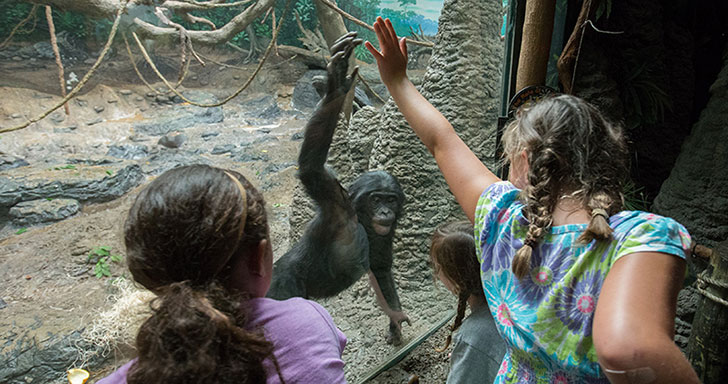

Do you know bonobos?
One student spends her summer studying their behavior
written by Tracy Chappelow, university marketing & creative services

Mary Kate Findley
By Mary Kate Findley’s observations, Zeke is a typical 4-year-old. He’s full of energy, literally bouncing off the walls, teasing an older male, Vim, then rushing back to his mother, Kimia, for reassurance.
Zeke also hangs upside down from man-made vines, grasping them with his feet. And that’s typical, too — for a bonobo.
Findley, a zoology major at Miami, is spending her summer studying bonobo behavior at the Cincinnati Zoo. But she isn’t looking for typical activity in these members of the ape family. She only records instances of hair-plucking, an action that may indicate stress.
At regular intervals, she jots the bonobo family’s grooming activities on a chart. When she sees hair-plucking, she notes whether it’s self-inflicted or done to another bonobo, its duration, and the method.
“We’re trying to figure out what triggers stress for the bonobos and what we can do to change this,” Findley said. “Our goal is to better manage their captivity and help them to stay healthy and happy.”
Their survival depends on it.
In the wild, bonobos are found only in the Democratic Republic of Congo, an area that’s now unsafe for researchers because of political instability. The Congo is also unsafe for its population of apes — bonobos, chimps and gorillas. These primates are killed for their meat and are victims of the overall violence in the region.
In the U.S., a third of this endangered species’ population is housed in Ohio at either the Cincinnati Zoo or the Columbus Zoo. Findley compares behaviors between the two zoos’ bonobo populations.
Her involvement with zoos began at age 13, when she and her twin sister, Susan, began volunteering at the Cincinnati Zoo. They now teach in the zoo’s education program, introducing grade-school children to exotic creatures such as the three-banded armadillo.
“Animal behavior has always been an interest of mine. I’ve taken a plethora of biological anthropology classes because they complement my zoology major and go deeper into the topics of evolution and primatology,” Findley said.
After a primate behavior class with Linda Marchant, professor of anthropology, Findley asked her advice about conducting primate research. Marchant, an internationally recognized expert in this field, suggested that Findley apply to Miami’s Undergraduate Summer Scholars program.
Through the program, she received a stipend that allowed her to focus on research for the summer. Marchant became her supervising professor.
“One thing I love about doing observational research is taking the empirical data as it happens. I learn something new about the bonobos each day. They still manage to surprise me and challenge me as a researcher. Research has been so interesting and engaging, and I hope to see all that the field of research has to offer,”Findley concluded.
